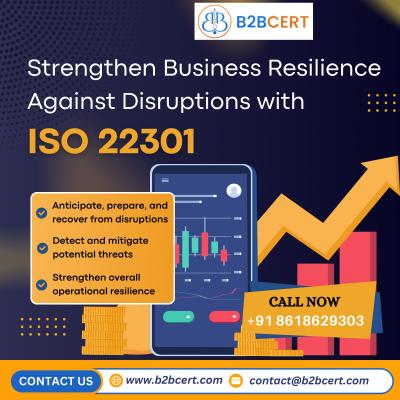Categories
Archives
What Should a Business Continuity Plan (BCP) Include According
-
In today’s fast-paced and unpredictable business environment, organizations must prepare for disruptions that can impact operations, revenue, and reputation. A Business Continuity Plan (BCP) serves as a roadmap to ensure that critical functions continue during and after unforeseen events. ISO 22301, the international standard for Business Continuity Management Systems (BCMS), provides organizations with a structured approach to building resilience and minimizing the impact of disruptions. For businesses in Bangalore aiming to strengthen their continuity strategies, obtaining ISO 22301 Certification in Bangalore can be a game-changer, and engaging with expert ISO 22301 Consultants in Bangalore ensures smooth implementation.
Understanding ISO 22301
ISO 22301 is the global benchmark for business continuity management. It provides a systematic framework to identify potential threats, assess their impact, and implement strategies to mitigate risks. A well-structured BCP under ISO 22301 helps organizations respond effectively to incidents, ensuring operational continuity and stakeholder confidence. For businesses seeking a competitive edge, leveraging professional ISO 22301 Services in Bangalore can streamline the certification process while building a resilient organization.
Key Components of a BCP According to ISO 22301
A comprehensive BCP aligned with ISO 22301 should include several essential elements:
1. Business Impact Analysis (BIA)
The first step in developing a BCP is conducting a Business Impact Analysis. BIA identifies critical business functions, evaluates their dependencies, and assesses the potential impact of disruption. ISO 22301 emphasizes understanding both the operational and financial consequences of business interruptions. This analysis forms the foundation of recovery strategies and ensures resources are allocated effectively.
2. Risk Assessment
ISO 22301 requires organizations to perform a thorough risk assessment to identify threats that could disrupt operations. This includes natural disasters, cyberattacks, equipment failures, and human errors. A robust risk assessment allows businesses to prioritize risks based on likelihood and impact, enabling the development of mitigation strategies that minimize vulnerabilities.
3. Business Continuity Strategies
Once risks are identified, the next step is to establish business continuity strategies. These strategies outline how critical processes will continue during a disruption. ISO 22301 recommends creating redundant systems, backup processes, alternative supply chains, and remote working arrangements. This ensures that essential operations can be maintained under adverse conditions.
4. Roles and Responsibilities
Clear assignment of roles and responsibilities is crucial for an effective BCP. ISO 22301 stresses the importance of defining accountability for decision-making and operational tasks during incidents. This includes designating a business continuity manager, crisis response team, and departmental coordinators to ensure seamless execution of the plan.
5. Communication Plan
Effective communication is key during a disruption. ISO 22301 recommends including a communication plan that defines how information is shared internally and externally. This involves notifying employees, customers, suppliers, regulators, and other stakeholders in a timely and coordinated manner to maintain trust and transparency.
6. Incident Response Procedures
A BCP should clearly define procedures for responding to various types of incidents. This includes immediate actions to protect personnel and assets, containment measures, and escalation protocols. ISO 22301 emphasizes testing these procedures regularly to ensure their effectiveness during actual emergencies.
7. Recovery and Restoration Plans
Recovery plans outline how to restore critical operations to normalcy after a disruption. ISO 22301 specifies that organizations should establish Recovery Time Objectives (RTOs) and Recovery Point Objectives (RPOs) for key processes and systems. This ensures that essential services resume within acceptable timeframes, minimizing financial and operational losses.
8. Training and Awareness
ISO 22301 highlights the importance of employee training and awareness. All staff should understand their roles during a disruption and be familiar with the BCP procedures. Regular drills and simulation exercises help test the plan, identify gaps, and reinforce organizational preparedness.
9. Monitoring and Review
A BCP is not static. ISO 22301 requires continuous monitoring and periodic review to ensure that the plan remains relevant and effective. Lessons learned from drills, actual incidents, and changes in business processes should be incorporated to improve resilience over time.
10. Documentation and Record-Keeping
Proper documentation is a core requirement of ISO 22301. The BCP, risk assessments, recovery strategies, and training records must be systematically documented and maintained. This not only aids in compliance but also facilitates smoother audits and certification processes.
Benefits of Implementing a BCP Under ISO 22301
Implementing a BCP according to ISO 22301 offers numerous advantages for businesses in Bangalore:
-
Enhanced Resilience: Organizations can continue critical operations despite disruptions.
-
Regulatory Compliance: Meets industry standards and regulatory requirements.
-
Stakeholder Confidence: Builds trust among clients, partners, and employees.
-
Reduced Losses: Minimizes financial and operational impact during crises.
Engaging with expert ISO 22301 Consultants in Bangalore ensures that your BCP meets global standards, while ISO 22301 Services in Bangalore provide end-to-end support from risk assessment to certification.
Conclusion
A robust Business Continuity Plan is a strategic necessity for every organization. Following ISO 22301 guidelines ensures that your BCP is comprehensive, well-structured, and capable of mitigating the impact of disruptions. By partnering with professional ISO 22301 Consultants in Bangalore and leveraging specialized ISO 22301 Services in Bangalore, businesses can achieve certification and build a culture of resilience that safeguards their operations, reputation, and future growth.
For companies seeking to fortify their operations, ISO 22301 Certification in Bangalore is more than just a standard—it’s a commitment to business continuity and long-term success.
-
